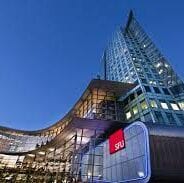Search results for career:
Executive MBA
Michigan State University Executive MBA Program Structure
The Executive MBA classes are held in-person. Students attend classes every other weekend at one of our three campus locations: East Lansing, Troy, or Detroit.
Classes are offered in a concentrated module format; each course meets four times spanning four in-class weekends. Friday evening courses run 6 p.m-10 p.m. Saturday courses run 8 a.m. to noon and 1–5 p.m.
Group meals on class day—breakfast, lunch, and dinner—provide dedicated time for students to connect with classmates. Technology is used to enhance the learning experience and to ensure that in-class time is interactive.
Curriculum
The 45-credit-hour Master of Business Administration (MBA) includes approximately 30 Executive MBA courses. The rigorous curriculum is designed to sharpen your business expertise and give you a competitive edge in your career. Throughout dynamic executive MBA courses, you’ll obtain the essential business knowledge, real-world skills, and insights you need to excel in the workplace and contribute to your company’s bottom line.
Our diverse set of courses focus on a wide range of subject matters, from strategy, leadership and management, to marketing, accounting, finance and supply chain management. Courses on information systems, business law and global perspectives are also incorporated into the comprehensive business curriculum.
Executive MBA Rankings
• Financial Times: 79
Class Profile
You’ll discover a diverse group of professionals. Our students hail from a wide variety of companies–from small, family–owned businesses and non-profit organizations, to global Fortune 100 corporations. They represent a range of cultural backgrounds, academic experiences, and family situations. However, all Executive MBA students have one thing in common: a tremendous drive to succeed.
The Executive MBA profile includes an average cohort size of 115 students with more than 80 companies represented. We require students to have at least five years of work experience to apply to the program, but most students have 12 years or more. Our current cohort includes a female population of 28 percent and an average age of 35 years old.
Tuition, Scholarships, and Financial Aid
The program offers a no-hassle, no-surprises, inclusive tuition package that include all tuition required course materials, hotel accommodations for orientation and residencies, and meals while on campus. Tuition will be established by the MSU’s Board of Trustees in June. For up-to-date tuition information, visit the website.
We offer students two scholarship opportunities:
• Executive MBA Alumni Association Scholarship
• Executive MBA Nonprofit Scholarship
Admissions
The following is required in order to apply:
1.) Attend a Preview Day or Information Session.
2.) Request transcripts from all previous college/university coursework. Applicants with degrees from non-U.S. institutions: please arrange for ONE official/certified/attested university or professional school records of subjects and mark sheets, transcripts, diplomas, and/or degree certificates to be sent to the address noted below from the principal or registrar of each school you have attended, or by the Ministry of Education in your country in a sealed envelope. The names of all certificates, diplomas, degree(s) earned, and dates received should be noted. Photocopies or notarized copies are not acceptable. Official translations must be furnished when originals are not in English. You must provide official transcripts. This process could take several months, so plan accordingly.
Send transcripts directly to:
Sarah Ellis | Admissions & Academic Services Coordinator
MSU Broad Executive MBA
The James B. Henry Center for Executive Development
3535 Forest Road, Suite A180, Lansing, MI 48910-3831
sellis@broad.msu.edu
3.) Identify, notify and enter two professional recommenders. These individuals will be automatically notified to provide their recommendations through a simple online form.
4.) Update and upload your professional resume.
5.) Complete the two online essays.
6.) Contact your campus of choice to schedule an interview:
For Lansing: 517-355-7603
For Detroit and Troy: 248-879-2725
A GMAT or GRE score is not required. While quantitative ability is a necessary skill, we seek evidence of each candidate’s ability through a variety of means such as previous course work, professional work experience, professional certifications, etc. An $85 application fee is also required.
Application deadlines are as follows:
Round 1: December 1, 2021
Round 2: February 1, 2022
Round 3: April 1, 2022
Round 4: June 1, 2022
Full-Time MBA
Michigan State University Full-Time MBA Program Structure
The Michigan State University Eli Broad College of Business MBA is a 61-credit degree that takes 21 months to complete. Three distinct components comprise the program: the core curriculum (31 credits); electives (18 credits); and the MBA concentration (12 credits). Concentration options include finance, human resource management, marketing, and supply chain management.
In total, the program features four separate semesters and a summer break, which includes the optional MBA Education Abroad Experience and the Summer Corporate Internship Experience. Those that do not take the MBA Education Abroad Experience must complete an international business course on the MSU campus. The program begins in the fall.
Curriculum
Within the flexible curriculum structure of the Eli Broad MBA program, students select a concentration and craft their own plan of study with elective courses to support areas of interest that complement their concentration area. The program takes place over 21 months and is made up of three components that ensure all MBA students develop both a strong foundation and subject matter expertise:
MBA Core Curriculum: 31 credits that provide foundational learning.
MBA Concentration: 12 credits that build subject matter expertise in one of four fields: Human Resources Management, Supply Chain Management, Marketing or Finance.
MBA Electives: 18 credits that deepen knowledge in areas of interest to drive relevant expertise to a desired career path.
As a Full-Time MBA student at Broad, you’ll learn by doing. Creativity and innovation are at the heart of our curricular design. Experiential learning opportunities help students maximize their knowledge, develop skills and clarify values by continuously applying what they learn in the classroom to real-world contexts
Class Profile
The diversity of the student population at Broad—in terms of ethnicity, gender, national origin, and professional experience—extends learning beyond classroom opportunities, with each student’s unique background considered an asset to be shared.
The class of 2021 has a cohort of 78 students with an average age of 28. Thirty-seven percent of the class identify as female, 32 percent are international students, 23% are minority students and 12% are military veterans. The average work experience of students is 4.7 years and the average GPA and GMAT are 3.3 and 674 respectively.
Careers
Eighty-two percent of the most recent class accepted job offers within 3 months of graduation. Their average starting salary was $110,311 with an average signing bonus of $21,429.
Full-Time MBA Rankings
• U.S. News & World Report: 40
• Financial Times: 43
• Forbes: 27
• The Economist: 35
Tuition, Scholarships, and Financial Aid
Getting the most for your investment and finding the best overall value are serious considerations. Paired with Broad’s pricing structure and the adjunct cost of lodging, food and travel, you owe it to yourself to take a close look and learn more about our program cost and tuition, available fellowships and scholarships, and financial aid opportunities.
Our focus is always on ensuring that, throughout your entire Broad experience and throughout your career, you maximize return on yourself. For added curriculum flexibility, the Broad MBA program offers a block tuition structure. Students may take up to 18 credits per semester, with a maximum enrollment of 68 credits in the four semesters of the MBA program. Through periodic meetings with the MBA advising team, students choose a mix of required and elective courses to create their ideal degree plan.
In State – $33,098
Out of State – $52,458
International – $52,458
The Broad full-time MBA program awards more than $2.6 million in competitive, merit-based fellowships and graduate assistantships each year to first- and second-year MBA students.
All applicants are automatically considered for fellowships and graduate assistantships. Applicants should apply early in the admissions year to be most competitive. Notification of a fellowship award for incoming students follows an offer of admission. Fellowships typically range from $2,000 to $31,000 per year for two years.
Admissions
The Broad Full-Time MBA program requires all applicants have completed a four-year undergraduate degree, or an international U.S. bachelor’s equivalent. Candidates who hold a three-year undergraduate degree along with a master’s degree are also eligible to apply.
Prospective students are strongly recommended to have a minimum of two years’ full-time work experience after a candidate has earned an undergraduate degree. The average admitted student has four years’ work experience. The admissions team occasionally will consider applicants with nontraditional full-time work experience prior to or during their undergraduate program.
All applicants must take either the GMAT or the GRE. The average GMAT score for the Class of 2021 was 674. We do not have a required minimum score. A GMAT or GRE score alone does not guarantee or deny admission to the program.
Note: The Broad Full-Time MBA program is conducting a pilot this year to accept domestic candidates with strong work experience and other admission criteria in lieu of the standardized test score.
The GMAT/GRE is required in order to receive a scholarship. However, a waiver is available to those meeting the following requirements:
• At least four years of progressive, post-bachelor’s work experience
• An additional interview by a Career Management Professional
• Strong recommendation from a supervisor
• Successful completion of non-credit online pre-requisite courses post-admission (during summer)
In addition, applicants must provide the following:
• A completed application
• Official transcripts
• A current resume
• Two essays (one written, one video)
• Two professional recommendations
• English language test scores (if needed)
• $85 application fee
Application deadlines are as follows:
| Round | Early Round | Round 1 | Round 2 | Round 3 | Round 4 |
|---|---|---|---|---|---|
| Application Deadline | October 4, 2021 | November 8, 2021 | January 10, 2022 | March 7, 2022 | April 4, 2022 |
| Decisions Mailed By | November 12, 2021 | January 14, 2022 | March 11, 2022 | April 8, 2022 | May 13, 2022 |
The Best Part-Time MBAs in Canada
Canada continues to grow as a global powerhouse for business education. The diversity of the student population, seeing the benefit of the country’s inclusive education system and healthy job market, often bypass the U.S. entirely for its neighbor to the north.
Canada’s high number of top-notch part-time programs only add to the appeal, as ever increasing numbers of people choose alternatives to a full-time MBA. Here are some of our favorite picks for the best part-time Canada MBA programs.
Best Part-Time Canada MBA Programs

Because “not everyone can press pause on their career,” the Beedie School of Business at Simon Fraser University offers working professionals a 24 month degree option. Classes take place in the evening, and 80 percent of Beedie part-time students receive a promotion or change positions during their time at SFU. Applicants must have four years of full-time work experience, and a competitive career of eight years is suggested. Strong candidates may also be eligible for a GMAT waiver during the admissions process.
Current tuition for domestic students is $41,200 CAD which can be paid over six semesters. For inquiries on international tuition visit Beedie’s financing page.

With one of the world’s highest percentages of international faculty, the Desautels Faculty of Management at McGill University is another leader in part-time MBA education in Canada. Students in the Desautels PMBA meets for six hours per week in the evening, completing the program over 36 months. In the first and second years of the program, students participate in a full week session early in the summer, followed by a break during July and August.
Professional development seminars and reflection sessions take place on one or two Fridays during each semester, providing students with insight on how their studies are informing their careers. Another feature of the Desautels part-time program is an international study trip during which PTMBAs widen their studies to a global scale.
Visit the school’s tuition and financial aid site for details on costs for international students.

Described as “practical in every way” the John Molson School of Business at Concordia University part-time MBA offers students a flexible schedule that is fully customizable. Classes are offered in the morning, afternoon, or evening for part and full-time students alike.
The 45 credit program is comprised of three 15 credit courses, and part-time students typically complete their studies in three to four years. To start, part-time students take an online ‘on-ramp’ set of prerequisites, followed by 10 core courses during the first section of the MBA and 15 credits in specialization courses.
Molson offers an international exchange program, in which students can choose to study in Germany, Israel, France, India, Japan, Trinidad, China, or Australia. Tuition and financial aid details can be found on the official school website.

The part-time MBA at the University of Toronto Rotman School of Management offers classes in either the morning or evening, with applications accepted on a rolling basis. Students attending Rotman benefit from the vast opportunity available to them in Toronto, one of the world’s leading startup communities.
Classes take place over 32 months with one year of core courses and the second year of both core and elective classes. In the third years students hone in further on their specialization with even more elective courses.
Two years of work experience is required for admission, and the average student has six years of previous work experience. The Rotman website offers info on scholarships, entrance awards, fellowships, and more.
YOU MAY ALSO LIKE: Toronto MBA Programs that Don’t Require the GMAT or GRE

The York University Schulich School of Business, like Rotman, holds classes both in the morning and evening in Toronto. Students complete the degree in ten terms (roughly three years). Students choose from 18 specializations, and time commitment can be shifted between full and part-time.
Schulich part-time MBAs begin the program with foundation courses, followed by a strategy field study in year two. During the third year, students hone further in on their specialization, based in their current careers or in a new field. Two years of work experience along with a four year degree, or three years of work experience with a three year degree are required. See Schulich’s MBA/PMBA brochure for more details on the degree.

At the Ryerson University Ted Rogers School of Management in downtown Toronto, part-time MBAs can choose from a 24 or a 36-month option. The 36 month option is open to those without a business undergraduate major. Evening classes take place for three-to-six hours per week, and applicants can plan on 10-20 hours of group work or study time per week.
Current tuition for domestic students is just $22,328 CAD, and $35,818 CAD for international applicants.

At the Wilfrid Laurier University Lazaridis School of Business, MBAs can earn their degree in as few as two years or as many as five; making it one of the most flexible options in the country. Graduates of all four-year undergraduate programs (not just business) may attend, as long as they have at least two years of work experience.
During the first four terms of the program, classes take place two evenings a week, and the fifth through tenth terms, classes are Monday through Thursday evenings with a daytime option. The program, according to recently published figures, cost around $34,009.60 CAD inclusive of program fees.

The University of Alberta School of Business part-time MBA is a 60 credit program. Classes are offered in the evening, supplemented by a one week intensive course in the spring and summer.
The Alberta part-time MBA, like many other programs on this list, begins with core courses, followed by a focus on one of five career tracks, including: Energy & Finance; Innovation & Entrepreneurship; Operations & Business Analytics; Public Sector & Healthcare Management; and Strategy & Consulting. A focus in real estate is also an option. More financial aid and tuition details can be found on the official school website.
Top MBA Recruiters: MetLife
Founded in 1868, MetLife—one of the world’s largest providers of insurance, annuities, and employee benefit programs—currently serves over 90 million customers in over 60 countries, including more than 90 of the 100 Fortune 500 companies. With such a rich history, it’s fairly easy to see why MetLife careers can be so appealing for MBA candidates and recent grads.
What MBAs Love About MetLIfe
According to Glassdoor, associates (a common entry-level job for MBA graduates) can pull an average salary of $90,522, with another $26,781 in cash bonuses. This figure is well above the national insurance associate annual average of $42,849; a 47 percent difference in salary alone.
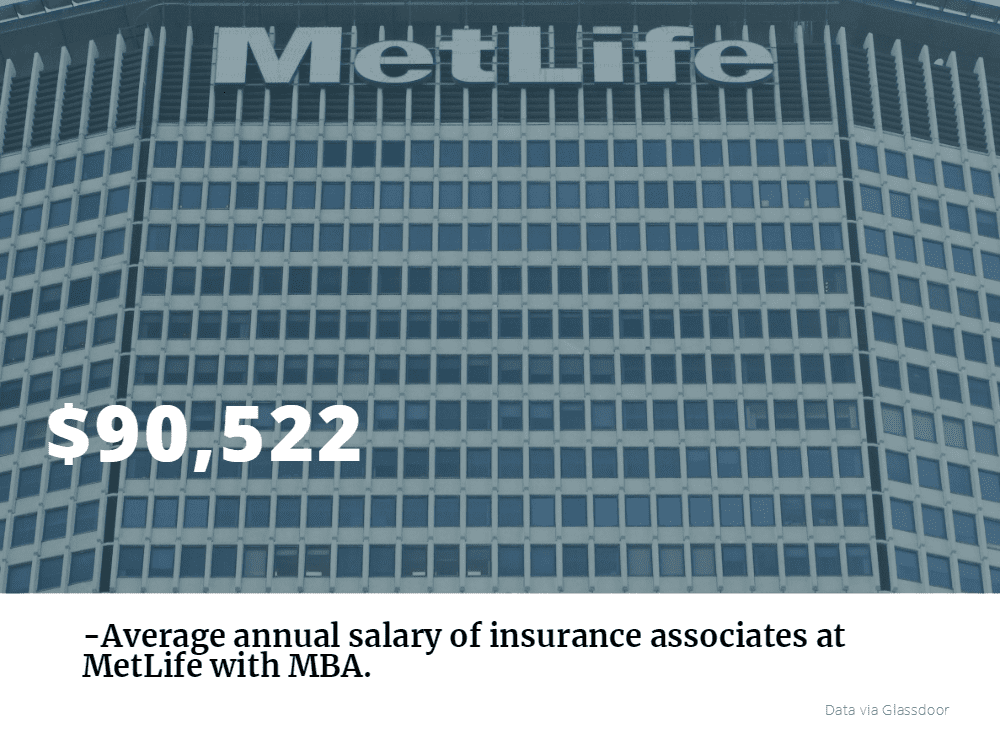
Another one of the main perks of working at MetLife is the variety of great benefits. MetLife offers health, dental, vision, disability, accident, auto, home, life, and even pet insurance. These insurance plans are also adaptable for MetLife employees who regularly travel internationally.
Legal services are also provided through MetLaw® for a wide range of potential legal issues, such as will and estate planning documents, real estate, traffic defense, and identity theft. MetLaw®, provided by Hyatt Legal Plans (a MetLife company), is a network of over 15,000 lawyers, with an average of 25 years of experience per attorney.
Working at MetLife
MetLife prides itself on offering employees training and development opportunities, allowing them to realize their full potential. MetLife’s international profile also offers employees the opportunity for global mobility and maximum geographic versatility.
The company actively fosters diversity through two distinct mechanisms. The first of which factors recruiting traditionally underrepresented minority groups. For example, the Global Women’s Initiative seeks out qualified female candidates and offers career development. The Veteran’s Initiative seeks to provide positive transition from military service to working life. And the People with Different Abilities Initiative empowers those with disabilities, striving to find the differently-abled candidates positions in which they can thrive.
The other method in which MetLife encourages an inclusive environment is through employee networks, such as the Global Multicultural Professionals (to create awareness around culturally diversity and to support diverse talent), Local Inclusion Action Teams (which support diversity in specific offices), GLAM (a network for LGBTQ+ employees and allies), and Families at MetLife (created promote a culture of understanding for working families).
MetLife sponsors a number of different resources designed to facilitate a healthy work-life balance. Work-Life ASSIST specifically offers coaching and resources to help employees with their day-to-day lives. Childcare and Eldercare support similarly offers resources for working families. On top of all that, workplace flexibility and PTO are integral to the livelihood of a MetLife employee.

Volunteer efforts, like its partnership with Habitat for Humanity, makes working at MetLife more than just a traditional job.
Finding MetLife Careers
MetLife has several programs that might appeal to recent MBA grads. The Global Leadership Development program offers those with three-to-five years of related experience an opportunity to cross-train in three rotational assignments, in conjunction with advice from a designated mentor and other senior leaders.
MetLife also prides itself on being proactive with regard to recent technological advances. As is the case across most industries, candidates with tech backgrounds are in high demand.
Current MetLife Careers
Several positions that favor individuals with MBAs are currently available at MetLife. Most of these jobs are located within the U.S.. However, there are also openings in Mexico, Singapore, Hong Kong, and the UK.
Associate – Asset Management: Washington DC
Candidates with five-or-more years of experience in asset management or commercial real estate might be interested in this Washington DC position at MetLife Investments. This position focuses on managing and reporting on existing MetLife assets, while also exploring stable ways to expand MetLife revenue through investments.
Director – Global Customer Experience Strategy and Planning: New York City
This NYC position is best suited for those who specialize in customer experience. It requires eight-or-more years of professional experience in management consulting or strategy and program management. However, it is perfect for those with a global mindset and entrepreneurial disposition.
Rochester Simon Answers 5 Questions About Their MBA Program
In our latest installment of the MetroMBA “5 Questions” series, we speak with Rebekah S. Lewin, the Assistant Dean of Admissions and Financial Aid at the University of Rochester Simon Business School. Lewin talks about the small, close-knit Simon MBA community, the optional STEM designation for all ten specializations, and the program’s highly approachable faculty members. She also introduces the Simon Admissions Blog as an excellent resource for prospective and current students. Read the full interview below to discover the four aspects of the Rochester Simon MBA program that every incoming student needs to know.
1. What should hopeful students know about the program that they may not necessarily know until they start?

Rebekah Lewin, Assistant Dean of Admissions & Financial Aid at University of Rochester
“The Simon program is small by design. The relationships our students build during their time here are the cornerstone of the collaborative, supportive community that defines the Simon MBA. Our class size at Simon is only about 110 students, which allows us to create a unique culture that we have heard time and again has a significant impact on student satisfaction.
The best way to get a sense of life at Simon—and what it’s like to be a part of our inclusive community—is to visit our campus. We offer four Experience Simon Weekend events throughout the year. They’re a great opportunity to interact with current students, alumni, faculty, and staff. We’d love to see you in Rochester!”
2. What makes Rochester Simon stand out amidst other programs?
“Rochester Simon offers an option for STEM designation in any of our ten specializations: Asset Management, Banking, Brand Management, Corporate Finance, Operations, Consulting, Pricing, Product Management, Strategy, Technology, and Venture Capital & Private Equity. Or, you can follow our general management track to choose from a broad selection of courses. STEM designation signals quantitative rigor to employers, and for international students, a STEM-designated MBA offers the ability to extend OPT (Optional Practical Training) by 24 months, for a total of three years to work in the US without H1-B visa sponsorship.
Our inclusive atmosphere benefits all members of the Simon community. Throughout your MBA experience, you’ll study alongside a diverse group of peers with unique experiences and varied perspectives. Forty percent of the Class of 2020 are international students hailing from 17 countries, and 31 percent of our U.S. students are African American, Hispanic American, or Native American. We encourage you to embrace our vibrant community to the fullest–and we know Simon will embrace you.”
3. How accessible are Simon Business School professors? Do they frequently serve as mentors?
“Though highly sought after for their subject-matter expertise and often at the forefront of innovative research, our faculty remain approachable, accessible, and dedicated to their role as mentors. With small classes sizes and a close-knit academic community, you’ll benefit from individual attention that supports your personal and professional growth.”

International students in the Simon Business School MBA Class of 2020 hail from over 17 countries.
4. Are there any courses, clubs, specialty tracks, or events that MBA applicants should know about?
In the spirit of the University of Rochester’s motto Meliora—Latin for “ever better”—we are always in the process of improving and innovating elements of our MBA program as industry needs evolve. Here are a few recent examples:
- Our innovative curriculum is career-focused and allows you to take more elective courses and to take them earlier in your course of study, to better prepare you for your internship experience. You will also choose two breadth electives designed to bolster the professional skills employers desire.
- There are various opportunities to make an impact at Simon, like our Net Impact club, which inspires, educates, and equips individuals to use the power of business to create a more socially and environmentally sustainable world. Simon’s chapter was one of two finalists for Net Impact Graduate Chapter of the Year in 2018. In addition, Simon VISION Consulting provides pro-bono consulting services to pro-profit and not-for-profit businesses throughout the Greater Rochester area.
- In order to expand your understanding of the global business marketplace, you need to see it up close. We offer international exchange programs in Finland, Germany, and Japan for the Spring A semester of the second year of the MBA program. In addition, we also offer shorter 10 to 12-day career treks and academic immersions to China, India, Israel, South Africa, and Switzerland.
- This year, Experience Simon Weekend with Diversity Conference Programming (Oct. 11-12) is the culmination of Simon’s Diversity and Inclusion Week. Our Experience Simon Weekend with Women’s Conference Programming (Nov. 8-9) grows more popular each year, a trend we expect will continue. We would love to host you here in Rochester for any of these events! Visit our website for more details.”
5. What’s your favorite online blog that you would recommend for students?
“We might be biased, but we think the Simon Admissions Blog is a great resource as you’re preparing for business school! It’s a great place to find everything from advice on navigating the admissions process from members of our Admissions Committee, to guest posts from students, Simon news updates, alumni videos, links to new Simon Bizcast podcast episodes, and more.”
Friday News – Vanderbilt Receives STEM Designation, Michigan Ross Honored by AACSB, and More
Let’s take a look at some of the biggest stories from this week, including the new Vanderbilt STEM designation at the university’s Owen Graduate School of Management.
Vanderbilt MBA Finance Concentration Receives STEM Certification – News & Events
The Owen Graduate School of Management at Vanderbilt University has announced that, starting this fall, its finance concentration will be a STEM degree program. This gives international students the opportunity to extend post-completion Optional Practical Training (OPT) in the US by 24 months.
Sue Oldham, Associate Dean, MBA Programs Operations, says, “We were able to work with our faculty to ensure that this STEM designation in the Finance concentration is one that would have an immediate impact, not only for our current students but for all prospective students… [It] is a direct result of the leadership team here listening to what our students are saying, specifically our international students.”
The OPT program enables international students to remain in the United States for 12 months in order to receive work training. With the new STEM designation, this period has been extended an additional 24 months for international finance students to build their careers. For more on the new Vanderbilt STEM designation, click here.
Michigan Ross Dialogue About The Future of Business Named for “Innovation that Inspires” – Michigan Ross News Blog
A discussion that took place last year at the University of Michigan Ross School of Business has been selected by the Association to Advance Collegiate Schools of Business (AACSB) for its contribution to academic thought and practice across the b-school community and the world at large.
“Working Toward Shared Prosperity: An Academic-Executive Dialogue,” included academics, along with business, labor, government, and nonprofit leaders who seek to improve conditions of employment and economic growth via practical solutions. Participants and attendees of the discussion came away with renewed energy toward enabling their academic work to address real world issues.
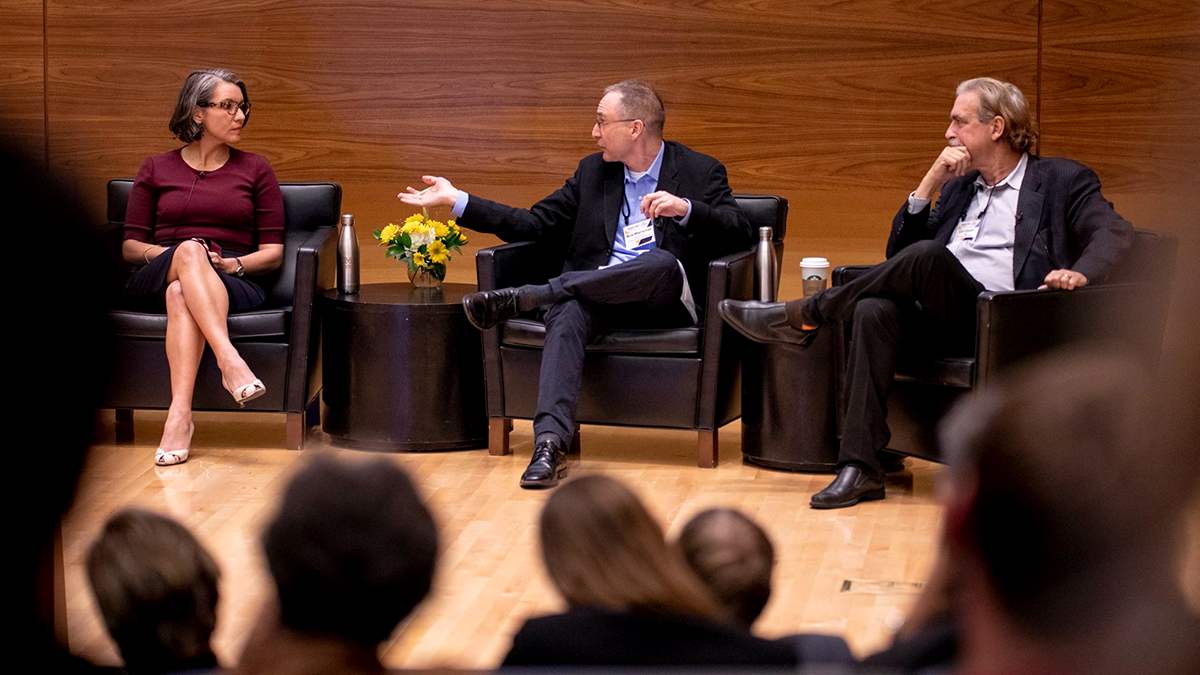
“Working Toward Shared Prosperity: An Academic-Executive Dialogue” earned the coveted 2019 Innovations That Inspire designation by the Association to Advance Collegiate Schools of Business (AACSB) / Photo via michiganross.umich.edu
The talk was a partnership between Michigan Ross and The Aspen Institute. Read more about the discussion, the AACSB, and the Aspen Institute here.
Economic and Environmentally Sustainable Solutions at the Forefront for the University of Toronto’s NeXus Consulting Group – Rotman News
The University of Toronto’s Rotman School of Management announced five of its MBA students joining its consulting group, NeXus Enterprises, which focuses primarily upon sustainability and social impact in its practice.
Founded in 2005, NeXus has worked with clients in 10 different countries to assist them in business planning, market research, financial modeling, scaling and expansion efforts. John Visser, a NeXus board member, says, “Social impact organizations are being challenged to deliver more value than ever before. Recent NeXus teams have executed a range of projects that have enabled boards and management teams to take their organizations to the next level.”
The new members of NeXus, all 2020 graduates of the Rotman MBA program, bring their expertise in technology, healthcare, marketing, design, engineering and construction to the group. Read here for more on NeXus and the Rotman team.
Marrying Science and Business Education For A More Sustainable Tomorrow – Fox School News
An industrial ecology project team at Temple University’s Fox School of Business, featuring an MBA student, a legal studies professor, and an engineering professor, have set an admirable example of how to meld disciplines.
Legal studies professor Daniel Isaacs Civil and Environmental Engineering Assistant Professor Avner Ronen, and MBA Vidya Sabella collaborated to solve a pressing problem: reducing wastes created by businesses.

(Left to right) Daniel Isaacs, Avner Ronen, and Vidya Sabbella / Photo via Joseph V. Labolito
Professor Isaacs (who is also head of the Global MBA program) says, “Business, technology, science and education should not be siloed. With broader educational opportunities like this one, environmental issues can be the drivers of innovation…Students and leaders alike need to start thinking about business in terms of what their obligations to future generations should be.”
You can read more about the team and project here.
MIT Food Systems Lab Announces Seven New Seed Grants – MIT News
The Abdul Latif Jameel Water and Food Systems Lab (J-WAFS) announced a new round of funding for an array of projects that will further innovation in farming and sustainable supply chain management in multiple countries. MIT Sloan is among the branches of the school to receive grant money.
Among the other innovations and developments will be increased food safety for everyday consumers; productivity technologies for small farmers, and water filtration methods for eliminating pollutants to food supplies. Thirty-four research teams applied for funding, and the directors of J-WAFS were tasked with choosing the best of the best.
Renee Robins, Executive Director of J-WAFS, says, “The broad range of disciplines that this applicant pool represents demonstrates how meeting today’s water and food challenges is motivating many diverse researchers in our community.”
Find more details on the seed grants and their recipients here.
The Top U.S. Entry Level Jobs and Internships of 2019
While work life balance, benefits, growth potential, and job security all factors to consider in your job search, the fact is that base compensation is more than likely the high priority. Getting an MBA is a sure way to increase earning potential, but where should you begin to look for the best internships and entry level jobs in such a vast and competitive playing field?
Glassdoor recently published its report on the highest paying internships and entry level jobs of 2019. We’ve broken down the report to help our readers discover just which of these positions and companies can offer them the best places to put their MBA talent to work.
Top 5 Entry Level Jobs for MBAs
One of the many pieces of good news from Glassdoor’s report is that as the number of tech jobs continue to increase, so does the need for business minded workers. This, along with the fact that finance and consulting positions follow right behind tech on the highest paid jobs list, should make b-school students optimistic for their prospects.
Product Manager
Product Management is a key role for any organization in the business of turning ideas into profit. According to blogger Dan Driscoll, who wrote a definitive article on the role, PMs are “closet-creative types with an ambitious acumen for business fundamentals and priorities, as well as masters of persuasion and consensus-building.”
Strong analytics skills along with a creative approach to problem solving are key for these positions. Engagement in design, development, support and marketing are all features of this role, which has a median base salary of $89,000 to start.

Major firms, such as Salesforce, are currently looking for top-tier product management candidates.
Investment Banking Analyst
Financial modeling, business valuation methods and strong presentation skills are just a few of the factors that comprise the Investment Banking Analyst role. The nuts and bolts of finance firms are the responsibility of the investment banking analyst, as they track live transactions along with M&A and private equity transactions.
At a starting median base salary of $85,000, this job is a great foundation on which to build a career.
Implementation Consultant
Implementation, according to coaching and recruiting site Firm Consulting, is one of the three main branches of consulting as a whole. Implementation teams take recommendations from Strategy and Operations consulting teams and turn them into realities. For instance, a company may be deciding to create a new division. Strategy and Operations consultants determine how best to profit from this, and implementation consultants make it happen.
ICs brand, execute and set up the division in this scenario, including relocation if necessary, along with on-boarding procedures. The starting base pay for ICs is $72,000.
Actuarial Analyst
Actuarial Analysts, who make a starting median salary of $66,250, are the workhorses of the insurance industry. Using statistical models, they analyze the probability and cost of various events (injury, accidents, and product failure, for example), and use this data to determine insurance policy pricing. Certification by either the Society of Actuaries (SOA) or the Casualty Actuarial Society (CAS) is required for these positions.
Actuaries must pass seven exams for the CAS and five in the SOA. This generally happens within a four-to-six year period, but students can begin the test while still enrolled in school. After passing the first and second exams, a student can start their first job. The ‘fellowship’ level of certification takes place over an additional two-to-four years.
According to the U.S. Bureau of Labor Statistics, the role of Actuarial Analyst has a 22 percent growth rate projected up to the year 2026.
Business Analyst
Business Analysts are key team players who make certain that companies’ current systems are as efficient as possible, and who develop strategic plans for growth. As agents of change, Business Analysts identify growth opportunities and reduce costs during these changes. Business Analysts work closely with IT departments to ensure that the best technologies are in place, and they also serve as a link between different departments of a company to ensure consistency.
Therefore, communication, diplomacy and a strong understanding of each business function are vital to success in this role. The four major components of development, modeling, process design (workflow creation), and systems analysis are the basic elements of the Business Analyst role.
To start, Business Analysts make a median salary of $63,000.
Top 5 Highest Paying Internships
Facebook leads the pack in paying its interns $8,000 per month, followed by: Amazon at $7,725; Salesforce at $7,667; Google, which pays $7,500, and Microsoft, offering interns $7,250 monthly.
Facebook tops Glassdoor’s 2019 ranking of the top-paying U.S. internships, with interns pulling in an estimated $8,000 per month
Each of these companies have highly competitive university recruitment programs. For details, see Facebook Careers, Student Programs at Amazon, Salesforce University Recruiting, Google Student Internships and Microsoft University Internships.
Those graduating now or in the near future from MBA programs have a solid advantage in today’s market; job growth is high in the U.S. and unemployment is low. While these high paying jobs and internships are clearly appealing for a reason, keep in mind that more intangible factors like company culture and proven trust in management are the things that will sustain you regardless of salary.
Executive MBA
Beedie School of Business Executive MBA Program Structure
Simon Fraser’s University Beedie School of Business offers two Executive MBA programs at its Segal Graduate School of Business: the Executive MBA; and the Executive MBA in Indigenous Business & Leadership (EMBA IBL). The standard EMBA program takes approximately 20 months to complete and the EMBA IBL takes an estimated 25 months. Both are held at the school’s downtown Vancouver campus. EMBA classes take place on alternating weekends. EMBA IBL classes take place for one or two weeks per course.
Both of the Beedie EMBA programs are built for mid-career professionals, with the Executive MBA in Indigenous Business & Leadership designed specifically for indigenous professionals. Those in the EMBA program also have the option to take the Americas MBA for Executives stream, which features residencies at four different business schools in the second year, of which include: The Beedie School of Business; the FIA Business School in Sao Paulo, Brazil; the ITAM, Instituto Tecnológico Autónomo de México in Mexico City; and the Vanderbilt University Owen Graduate School of Management in Nashville, U.S.A.
Curriculum
The first three terms of the EMBA program focus on “managerial skills, building on your existing work experience,” according to the business school. These initial terms, starting in September, begin with an orientation, leading to team exercises, and core coursework in subjects such as accounting and business ethics. The final three terms of the program are designed for more experiential learning, infusing elements of the EMBA IBL program, as well as career preparation, and the final capstone project. Students completing the Americas MBA for Executives stream will begin their four residencies in the second summer term, beginning in Vancouver (August), then Brazil (October), Mexico (February), and ending in Nashville, U.S.A (April).
EMBA IBL students begin the program in fall, starting with the orientation segment, similar to the standard EMBA program. The first semester is dedicated to core learning, featuring subjects like Leadership and Teamwork and Business Communication. In the second term, students will travel to the Native Nations Institute in Tucson, Arizona, for a field study, before continuing more traditional MBA courses, like Accounting for Decision Making. No summer term takes place during the first year. However, the final five terms of the program features a summer semester, in which students begin working on their final capstone project, which is completed in the subsequent fall term. The program concludes the following spring.
Class Profile
The SFU Beedie EMBA class typically features about 33 percent female students and 67 percent male students, of which are, on average, 41-years old. The average work experience is about 18 years per student.
Tuition, Scholarships, and Financial Aid
The SFU Executive MBA at the Beedie School of Business costs an estimated $57,100 CAD, while the EMBA IBL program costs $55,500 CAD. These costs cover most expenses, including materials, workshops, off-site orientation, and more. Travel expenses and other accommodation are not included in price estimates. A $1,000 fee is also required to hold a spot in the EMBA program after earning acceptance. A $250 fee is required for the EMBA IBL program.
Information on scholarships and external financing for the EMBA IBL program can be found here. Federal and private loans may vary, depending on the origin of the applicant. Most international applicants are subject to private loan options.
Admissions
Applicants to the SFU Executive MBA program at the Beedie School of Business should have a minimum of 10 years of prior work experience, at least four years of previous management experience, and are currently employed. Prospective applicants must have an accredited Bachelor’s degree with at least a 3.0/4.33 (B) GPA, or a 3.33/4.33 (B+) GPA in the last 60 credits of undergraduate coursework, or, a CA, CMA, CGA, CPA, CGA or PEng professional designation. Those with a GPA lower than 3.0/4.33 (B), but have substantial professional experience, may be admitted. The GMAT is not required but can help strengthen one’s application.
Applicants to the SFU Executive MBA program must also submit the following:
• A completed application
• Official transcripts
• Three letters of reference
• Application fee of $90 (Canadian residents) or $125 (International residents)
• A self-evaluation
• An organizational chart
• Current Resume
• GMAT/GRE scores (if needed)
• Proof of English proficiency (if needed)
Applicants to the Executive MBA in Indigenous Business and Leadership program must have previously earned an undergraduate degree, regardless of the field, or a two-year technology degree with strong grades, five to ten years of work experience and at least four years of management experience, and proof of English proficiency, if necessary.
EMBA IBL applicants must also provide:
• A completed application
• Application fee of $90 (Canadian residents) or $125 (International residents)
• A self-evaluation
• An organizational chart
• Current Resume
• Proof of English proficiency (if needed)
• GMAT/GRE scores (if needed)
• Three letters of reference
Application deadlines are as follows:
- Round 1: November 19, 2021
- Round 2: February 25, 2022
- Round 3: May 13, 2022
- Final Round: June 24, 2022
School v. School: Queen’s University Smith School of Business vs Toronto Rotman School of Management
Apples or oranges? Steak or chicken? Toronto or Kingston, Ontario? If you’re having a difficult time making a decision, you’re not alone. When it comes to choosing the best MBA program for your needs, there can be more than one choice that seems like the “perfect” fit, so how make a final decision? It’s not easy, but that’s what we’re here for.
Our School v. School series offers a point-by-point comparison of two highly respected MBA programs in Ontario: Queen’s University Smith School of Business and the University of Toronto Rotman School of Management. Keep reading to see how each school stacks up. Continue reading…
Friday News – USC Hosts Venture Summit, FSU’s Master’s of Business Analytics Class Graduates, and More
Let’s take a look at some of the biggest stories from this week, including the USC Venture Summit.
Venturing Ahead – USC Marshall Hosts 8th annual Venturing Summit – USC Marshall News
The Lloyd Greif Center for Entrepreneurial Studies at USC Marshall hosted the 8th annual University Venturing Summit this month.
The event gave Future entrepreneurs from USC’s MBA community the chance to meet with VCs and supporting businesses such as accounting and law firms. USC faculty also took part in the Summit, including Patrick Henry, Assistant Professor of Clinical Entrepreneurship and organizer of the Summit.
“The perception of a lot of university ventures is that they are still in the ‘good idea’ stage…But the reality is that the university venturing world is more market-ready than ever, and university ventures are more ready to launch than ever,” Henry says.
USC MBA alum Jessica Schleder presented her venture, Adoptimize, which allows insurance providers to increase their volume of leads through streamlining the pet adoption process. Other student ventures, including a data security tool, addressed the trends present in the L.A. economy and beyond.
Sponsored by EY, among other private firms, the Summit also hosted student entrepreneurs from UCLA Anderson, UC Irvine, and Cal State University Northridge. Click here for more on the Summit and its participants.
Inaugural Class of Master’s in Business Analytics Students Set to Graduate – FSU College of Business News
Florida State University College of Business’ first Master’s in Business Analytics (MS-BA) class graduated this month from the School of Business.
The program was created in order to meet the demands of an economy increasingly driven by data, and its analysis and application in helping businesses grow. Students in the program combine a strong command of quantitative skills in various backgrounds with a desire to develop their powers of analysis.
One graduate, Jessie Tolbert, started his career as an environmental scientist. Curious about how the data he gathered was used to improve environmental conditions, Tolbert decided to pivot into analytics with the MA-BS degree. “I’ve learned in-demand technical skills and built my professional network with other students, distinguished professors and FSU alumni who are in the industry,” Tolbert says.
The degree comes on the heels of such studies as one by McKinsey, showing a 60 percent gap between the demand for talented analysts and the supply of qualified people in the workforce. For more on Florida State’s MS-BA, read here.
Village of Oak Park Partners with Graduate Marketing Class – Quinlan School of Business News
In an effort to retain both the rich history and the future growth of the Oak Park neighborhood, Loyola University of Chicago’s Quinlan School of Business MBA alum have teamed up with Oak Park residents and current Quinlan grad students.

Loyola Quinlan alumni Eric Pedersen (left) and Jeff Prior (right) / Photo via luc.edu
Eric Pedersen (MBA ’01), of the Oak Park Neighborhood Services team, sought to improve the visibility of the community’s housing rehabilitation loan program. “The need was a short, consistent, and readily understandable message, combined with a visually appealing ad campaign … And we needed it in less than 60 days with a very modest budget.”
The loan program assists those in need—the recently unemployed, people with disabilities, seniors, and single parents—obtain interest free loans to make necessary home improvements.
Quinlan Professor of Marketing Katie Hession’s class was able to work under the tight deadline and budget to create the program’s ad campaign. Using the tagline of “Brick by Brick, Chip by Chip, Panel by Panel, and Picket by Picket,” the ad package contains visually striking images and bold messages regarding the program. For more on the ads and Oak Park’s community improvement efforts, read here.
Wharton School Forms Analytics at Wharton – Wharton News
The University of Pennsylvania Wharton School announced the establishment of Analytics at Wharton, which unites industry leaders, researchers, and faculty with the goal of harnessing big data to help businesses grow.
An anonymous $15 million gift has allowed the creation of the Data Science and Business Analytics Fund. Wharton Dean Geoffrey Garrett says, “In the 21st century, leaders will increasingly use data and analytics to develop insights that will help them make better decisions and become better leaders. The creation of Analytics at Wharton demonstrates our commitment to using big data to transform how business is done.”
Along with the fund comes the creation of a new leadership position at Wharton, the Vice Dean of Analytics. Eric T. Bradlow, the K.P. Chao Professor and Professor of Marketing, Economics, Education, and Statistics will hold this position.
The new initiative will bring five existing Wharton programs: Customer Analytics; the Penn Wharton Budget Model; People Analytics; Wharton Neuroscience; and Wharton Research Data Services. For more on Analytics at Wharton, read here.
Brookings Institution Appoints Lemma Senbet to Africa Board – News at Smith School of Business
University of Maryland’s Robert H. Smith School of Business has appointed Professor Lemma Senbet to the Distinguished Advisory Board of the Africa Growth Initiative at the Brookings Institution in Washington, DC.
The Advisory Board is responsible for guiding members of the Africa Growth Initiative on key economic and social issues faced by the continent. Lemma W. Senbet is the William E. Mayer Chair Professor of Finance at the Smith School of the University of Maryland and the founding director of the school’s Center for Financial Policy. He also serves on the Ethiopian Diaspora Trust Fund’s Advisory Board, and he is the former executive director and CEO of the African Economic Research Consortium.
Africa Growth Initiative Director Brahima S. Coulibaly says of Senbet’s appointment, “[Senbet joins a distinguished] panel of select, high-level policymakers, academics and practitioners on African socio-economic development issues.”
You can read here for more on Senbet and the Africa Growth Initiative.
Management of Technology MBA
Beedie School of Business Management of Technology MBA Program Structure
The SFU Beedie Management of Technology MBA (MOT MBA) is a 24-month, five semester program featuring no more than 45 students. The program officially begins in early September with a mandatory four-day orientation. Classes are held two days per week, on Mondays and Thursdays. Two additional three-day intensive classes are also featured in the program. The experiential element of the program involves visiting flourishing tech companies in Vancouver.
Curriculum
Like the other Simon Fraser Beedie School of Business MBA offerings, the MOT MBA program features preliminary “refresher” courses on topics like financial accounting, and programs like Excel. These 30-hour courses are taken complete online in the summer months leading up to the start of the program in September. Waivers for these courses are offered to select students.
Following the four-day orientation segment, students in the MOT MBA program begin with the following courses:
• Leadership for the Technology Driven Enterprise (taken mostly on weekends)
• Financial and Managerial Accounting
• Managing Technological Innovation
The first spring semester features the following courses:
• Managerial Economics for Technology Firms
• Strategic Use for Information Knowledge
• Business Ethics (taken mostly on weekends)
The first courses of the summer semester cover the topics of Business Operations Design and Entrepreneurship.
Classes in the second fall semester are:
• Managing Self and Others (taken mostly on weekends)
• Marketing Technology Based Products and Services
• Financing the Organization
The classes in the second spring semester are:
• Strategic Management of Technology Based Firms
• Project Management
• Negotiations (taken mostly on weekends)
• Biotechnology Options
The final semester of the program features the capstone project, classes covering industrial business, and the experiential learning project.
Class Profile
The average age of the most recent Simon Fraser Management of Technology MBA class is 36. Students join the program with an average of 11 years of prior work experience.
Career Statistics
The average annual salary of Simon Fraser Management of Technology MBA grads is around $106,244 CAD.
Tuition, Scholarships, and Financial Aid
The current cost of the Simon Fraser Management of Technology MBA program is $37,100 CAD for domestic students and current Canadian residents. The MOT MBA Experiential Industry Project costs an addition $600 CAD. Textbooks and materials will cost about $2,500 CAD, and all other additional student fees are about $2,250 CAD (health insurance, transit, etc).
A $1,000 CAD fee is required to hold a spot in the program upon acceptance. Payment must be made with 21 days of earning an acceptance letter.
Federal and private loans may vary, depending on the origin of the applicant. Most international applicants are subject to private loan options.
Admissions
Like Beedie’s other MBA options, students applying to the MOT MBA program must have an accredited Bachelor’s degree with at least a 3.0/4.33 (B) GPA, or a 3.33/4.33 (B+) GPA in the last 60 credits of undergraduate coursework. Four years of work experience is required. The program specifically admits students already working or have a current employment offer in the Vancouver area. GMAT scores are required for admission.
However, those that have extensive experience may be eligible for enrollment without an undergraduate degree.
Applicants must also submit:
• An online application form
• Three reference letters
• An application fee of $90 (Canadian residents) or $125 (International residents)
• A current resume
• Official transcripts
• Proof of English proficiency (if needed)
• A self-evaluation form
Applications Deadlines
- Round 1: November 26, 2021
- Round 2: March 4, 2022
- Round 3: May 27, 2022
- Final Round: June 24, 2022
Part-Time MBA
Beedie School of Business Part-Time MBA Program Structure
The 24-month Simon Fraser part-time MBA program, unlike the other programs at the Segal Graduate School of Business, is held at the Surrey, Canada campus. The program is designed much like the full-time program, aside from the internship conclusion of the program, only extended from 12 to 24 months. The maximum class size is 50 students.
Curriculum
After completing the required “refresher” courses, students officially begin the program in December at a one-night on-campus event, meeting with other students and faculty members. Students from the Graduate Diploma in Business Administration program are introduced the following semester.
The first semester of the program, from January to April, includes Business Ethics courses, 12 evenings of Managing People & Organizations courses, and 12 evenings of Financial & Managerial Accounting courses. The summer semester encompasses Special Topics in Business, Indigenous Business Environments, and Business Analytics classes. The first fall semester features courses in Sustainability and Managerial Finance.
The second summer semester includes 12 evenings of Managing Information Systems classes, 12 evenings of Operations Management classes, and a three-day Negotiations project. The final fall semester features 12 evenings of Managerial Economics classes, 12 evenings of Business Strategy classes, and the final three-day Leading Self and Others project.
Class Profile
Fifty students are enrolled in the part-time Simon Fraser Beedie MBA class. These students are, on average, 35-years old, have 12 years worth of work experience, four years of management experience, and a GMAT of 600. Forty-four percent of the class is female, 56% of the class is male.
Career Statistics
Career resources are available through the Career Resource Centre and the university’s vast network of international alumni.
Tuition, Scholarships, and Financial Aid
The current tuition rate for domestic students of the Simon Fraser part-time MBA program is $43,200 CAD. Student fees are an additional $4,135 CAD and material fees add up to $1,200. A $2,000 CDN fee is required to hold a spot in the program after earning acceptance. An additional $250 CAD fee is required for the Business and Indigenous Communities experiential learning project.
Federal and private loans may vary, depending on the origin of the applicant. Most international applicants are subject to private loan options.
Admissions
Prospective applicants must have an accredited Bachelor’s degree with at least a 3.0/4.33 (B) GPA, or a 3.33/4.33 (B+) GPA in the last 60 credits of undergraduate coursework. Four years of work experience is required. The GMAT is required, with a minimum score of 550. The GRE is also accepted, with a minimum score of 150 required for each section. A competitive GMAT average is at least 600 and the GRE average is about 310.
Applicants that have completed the Graduate Diploma in Business Administration (GDBA) may be able to have some courses waived for the program. In addition, those that had completed the GDBA with a GPA of 3.5 or more can waive the GMAT requirement.
Applicants to the Simon Fraser part-time MBA program must also submit the following:
• A completed application
• Official transcripts
• Two letters of reference
• Application fee of $90 (Canadian residents) or $125 (International residents)
• Resume
• GMAT/GRE scores (if needed)
• Proof of English proficiency (if needed)
Application deadlines are as follows:
Round One – June 18, 2021
Round Two – August 25, 2021
Final Round – October 20, 2021
Real Humans of the University of Michigan Ross School of Business Part-Time MBA Program
For MBA hopefuls looking to enroll in a part-time program in the United States, there is a certain unspoken caveat. While the part-time is often presented as the malleable, flexible alternative to the traditional full-time program, it is often just a different restrictive version. For many schools, even some of the most prestigious in the country, the choice between full-time and part-time is simply just two options. However, the University of Michigan Stephen M. Ross School of Business has continually expanded the parameters of what a part-time program can truly be.
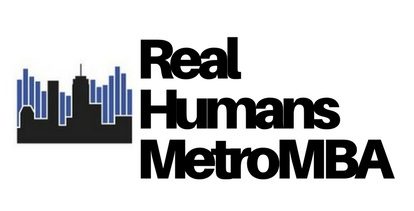
The Michigan Ross part-time MBA, ranked as the sixth best in the country according to U.S. News & World Report, isn’t simply a longer version of the full-time offering. Rather, the school gives potential students three indelibly different avenues to take. The 60 credit part-time Evening MBA, perhaps the most “traditional” part-time offering from the school, allows students to craft their own academic schedule, with classes offered after work on weeknights, weekends, and online. Some courses can even be taken during the day with the full-time MBA cohort at the school’s Ann Arbor campus. The part-time Weekend MBA offers a more compressed schedule, in comparison, with classes held every other weekend. In contrast to the Evening MBA offering, which takes three-to-four years to complete, the Weekend MBA offering can be finished in just two years.
Two part-time MBA variations may not seem unconventional, but few schools regularly lauded as much as Michigan Ross (10th overall in U.S. News & World Report, 19th globally in Bloomberg) also have the option of an Online MBA.
In late 2018, Michigan Ross introduced its brand new Online MBA program, embracing the ever-changing business school landscape head on. It wasn’t too long ago that the idea of an online degree, never mind an online MBA, was met with heavy skepticism, with major academic institutions sticking with traditional degrees despite the oncoming sea change. And while the inclusion of the online option to its part-time MBA opportunities may have seemed unorthodox at first glace, the administration crafted it as carefully as it does all its MBA programs.
In a recent interview with MetroMBA, Anne Schoen, Associate Admissions Director of Part-Time MBA Programs, talks about how the Online MBA features all-important elements found all of the school’s MBA curriculum:
“One of the signature features of a Michigan Ross MBA is an emphasis on action-based learning, and our Part-Time MBA: Online is no exception. Our three required on-campus residential experiences and required Multidisciplinary Action Project (MAP) course set us apart from other online programs. Our students will enjoy the flexibility of an online program, but also will benefit from engaging in-person with faculty and fellow students during these fully immersive experiential learning projects. These experiences will require that students take the theories they learn in class and apply them to real-world business scenarios. We also will offer our online students full access to our Career Development Office resources, including assistance with on-campus and off-campus recruiting, and individualized career development planning.”
When talking with several Michigan Ross part-time MBA Class of 2020, the school’s expansive options seem to reflect the diverse background of its students, of which include an experienced engineer from Kanpur, India, a former restaurant manager from New England, and a Canadian chemist, among others. Read on to see their stories and what the future may hold for life after an MBA.
Top MBA Recruiters: Spotify
Spotify, arguably the reigning champion of streaming audio content, shared a triumphant Q4 report with its shareholders late last year: “For the first time in company history, operating income, net income, and free cash flow were all positive.”
Ten years in, Spotify’s business model—a combination of premium paid access and “freemium” ad-based access—miraculously legitimized the Napster template to the tune of enormous profits. To make matters complicated, the Swedish company’s resounding success has been a major source of controversy among musicians whose life’s work the platform is built on.
When Spotify shared its year-end round-up metrics late last year, one image made the social media rounds that compared the company’s annual revenue of $1.37 billion to the 1,117,021 streams required for an artist to make minimum wage and a $0.0037 average per-stream royalty.
One might now understand why many high-profile musicians, like Prince, The Beatles, Taylor Swift, and Neil Young, initially refused to stream their music on Spotify. The composer and harpist Joanna Newsom disparaged Spotify in a 2015 LA Times interview as a “villainous cabal of major labels … built from the ground up as a way to circumvent the idea of paying their artists.”
But the platform’s growing power and presence have coerced musicians to play ball, even if they are reluctant to do so. Whether Spotify’s overall operating structure and approach to content distribution is viable for the long-term remains to be seen.
For MBAs looking for a way to help musicians from inside the belly of the beast, let’s take a look at employment at Spotify.
Landing a Spotify Job
Known for its constant intake of employees, Spotify maintains several divisions and publishes both job openings and internship opportunities. Employees report that internal referrals, stand-out experience and direct engagement are the best way to get hired.
Spotify’s HR team reports receiving hundreds of thousands of resumes each year. So, an early career MBA’s best bet at landing a permanent position may be to secure an internship. Seasoned business leaders would do well to draw the attention of Spotify’s Acquisition Team.
Spotify Job Salaries
According to Paysa, a comprehensive salary comparison tool, those in product management roles at Spotify can expect to earn salaries that average more than $190,000 per year. Even the rough average salary for the company, regardless of position, is about $125,000 per year (below).
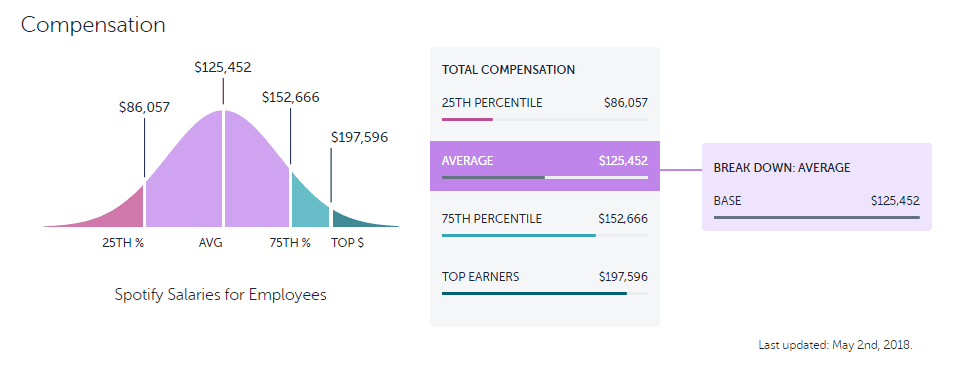
What a Spotify Internship Looks Like
Internships are offered in various academic formats alongside occasional graduate and training opportunities. As an intern, Spotify claims, “You’ll be right at the heart of major projects, working with teams of passionate people to create the next awesome thing.”
Spotify places interns at its office locations around the world. These positions tend to be highly competitive so it may take some creative maneuvering to get your foot and nail the interview.
Former intern Andrea Tiutan explains, “I knew that researching and understanding my future hiring managers would help me cater my answers to their interview questions to what they wanted to hear. All this would also help me know how to present my market research project in the most compelling way.”
Spotify Recruitment
In a 2017 blog post, Spotify’s Talent Acquisition team head, Fredrik Johnsson, explains how Spotify recruiters are evaluated based on finding successful matches to the company’s needs, rather than the traditional metric of number-of-hires:
“I focus on letting my managers evaluate the behaviors I need in my team. I need courageous team players, people who act as true talent acquisition partners to the organization and who I can trust to take the hiring decisions that are right for the company in the long run.”
If Johnsson’s approach rings true, experienced MBAs would be wise to clearly frame how their own expertise and leadership aligns with Spotify’s specific needs.
In terms of how to get in front of recruiters, Johnsson explained in a 2018 post that his team team uses LinkedIn’s Talent Insights as a search tool.
Choosing Spotify
Spotify is known for its decentralized leadership structure and consensus-oriented decision-making. Some employees report that this, in combination with suboptimal HR practices and ineffective middle management, makes both the impact of their work and opportunity for advancement a challenging prospect.
On the other hand, some employees report that they appreciate the community of peers, benefits, and work-life balance the company offers. With Spotify’s recent announcement that it plans to further expand both its operations and market reach, now may be an optimal time to grab a seat at the table. That is, of course, for those willing to take on both the good and the bad with one of the world’s highest-profile businesses.
Full-Time MBA
Beedie School of Business Full-Time MBA Program Structure
The Simon Fraser full-time MBA at the Beedie School of Business is a 12 month program, combined with a four month internship. Before classes start in the fall, students complete pre-MBA online courses, such as Excel and Financial Accounting, establishing a base education for the program. After completing core coursework in the first two semesters, students are introduced to the international leg of the program, moving into creative coursework, workshops, and the final capstone project. At the conclusion of the 12 months, the optional internship portion begins, acting as the final element of the program. Those that have a permanent, full-time role lined up do not have to take the internship at the end of the program.
Curriculum
The first semester of the program is dedicated to essential core courses, with classes centered around Essential Business Skills. Following the spring semester is built around organizational dynamics, which features, "intense, multi-day business simulations; mock company scenarios where everyone is assigned a specific role."
The international portion of the program, between the spring and summer semesters. Previous classes traveled to countries such as Argentina, Brazil, Colombia, and more. The final semester, prior to the optional internship portion, is dedicated to post-MBA career work, featuring career workshops, resume assistance, and mock interviews.
Class Profile
The full-time MBA class at the Beedie School of Business earned an average GMAT of 620 and have five years of previous work experience. The average age is 29, with 52 percent female students and 48 male students.
Tuition, Scholarships, and Financial Aid
For Canadian citizens and permanent residents, tuition for the Simon Fraser full-time MBA program is about $42,135 CAD. The cost is $55,825 CAD for international applicants. Textbooks and other materials cost an estimated $2,200 CAD, and student fees are an additional $2,500 CAD. A $2,000 CDN fee is required to hold a spot in the program after earning acceptance.
Transportation costs of international travel experiences are also not included in the estimated tuition fees, which should range between $5,500-6000 CAD. All Business & Indigenous Communities courses are an extra $250 CAD.
About 50-60 percent of students earn merit based scholarships within the program, which do not require any application process. Scholarship funding can range from $2,000-20,000 CAD.
Federal and private loans may vary, depending on the origin of the applicant. Most international applicants are subject to private loan options.
Admissions
Prospective applicants must have an accredited Bachelor's degree with at least a 3.0/4.33 (B) GPA, or a 3.33/4.33 (B+) GPA in the last 60 credits of undergraduate coursework. Two years of work experience is required, although the school suggests each student has at least four years of experience. The GMAT is required, with a minimum score of 550. The GRE is also accepted, with a minimum score of 150 required for each section. A competitive GMAT average is at least 600 and the GRE average is about 310.
Applicants that have completed the Graduate Diploma in Business Administration (GDBA) may be able to have some courses waived for the program. In addition, those that had completed the GDBA with a GPA of 3.5 or more can waive the GMAT requirement.
Applicants must also submit the following:
• A completed application
• Official transcripts
• Two letters of reference
• Application fee of $90 (Canadian residents) or $125 (International residents)
• Resume
• GMAT/GRE scores (if needed)
• Proof of English proficiency
Face to face interviews are a required element of the admissions process.
Application deadlines are as follows:
- Round 1: November 27, 2020
- Round 2: January 29, 2021
- Round 3: April 2, 2021
- Final Round: June 18, 2021
These Tech Companies Are Looking Out for More MBA Talent
LinkedIn may be one of the go-to places to grow a professional network and find job listings, but it’s also an MBA recruiter. Check out this list of exciting new MBA jobs at LinkedIn, as well as a handful of other tech companies, and see how well your resume lines up with these job descriptions. Continue reading…
Top MBA Recruiters: IDEO
If you’re interested in international design and consulting, IDEO (pronounced eye-dee-oh) should be on your radar. Launched in Palo Alto, CA in 1991, the company is known for using design-thinking methodology to design its products, services, environments, and digital experiences. They’re involved in a wide range of consumer products (toothbrushes, computers, personal assistants, etc.) experiences (non-traditional classrooms), as well as management consulting and organizational design.
Known for designing the first manufactured mouse for Apple, IDEO leads the way for human-centered design. As their website says, “IDEO has long been at the forefront of creating change through design.” Continue reading…
KSU Opens New Location, Blackstone Exec Addresses McDonough Grads, and More
Let’s take a look at some of the biggest stories from this week, including the a new Coles MBA classes held in Sandy Springs.
Kennesaw State To Offer MBA Courses in Sandy Springs, GA – Sandy Springs City News & Media
Next fall, Kennesaw State University’s Michael J. Coles College of Business will expand its MBA course offerings to Sandy Springs, GA. This will be the school’s third location.
MBA courses are currently offered at the Kennesaw Campus and the Cobb Galleria. The campus’ new extension is the result of a partnership between Kennesaw State, the City of Sandy Springs, and its Chamber of Commerce. Robin Cheramie, Coles Interim Dean, announced the new offerings. “We are thrilled to be opening our doors to the business community in Sandy Springs. The partnership … creates more opportunities for KSU to provide career-enhancing education to Atlanta’s business population.”
Increased demand for part-time MBA courses in Atlanta’s metropolitan area was the catalyst for the Sandy Springs location, which was first announced in April 2018. The area has a high number of working professionals who will greatly benefit from the chance to complete their studies without interrupting work schedules.
Sandy Springs Chamber of Commerce Tim Mahaffey says, “With the KSU program located [here], employees will have the convenience of leaving their workplace and being in their classrooms within minutes.”
You can read here for more on the new Kennesaw State University MBA classes.
Blackstone Executive to Address Georgetown McDonough Graduates – Georgetown University Newsroom
Georgetown University McDonough School of Business alum Joseph Patrick Barratta II, (B ’93) will deliver the commencement address on May 17, 2019.
Barratta is a Senior Managing Director and the Global Head of Private Equity at Blackstone. After joining the firm in 1998, Barratta advanced quickly to help establish its European corporate private equity business in London. Over his two decades with Blackstone, he has been responsible for many of its most significant private equity transactions.

McDonough alum and Joseph Patrick Barratta II, the Senior Managing Director and the Global Head of Private Equity at Blackstone, returns to his alma mater on Friday, May 17, for the business school’s 2019 commencement.
A trustee of the Tate Foundation, Barratta also serves as a board member of Year Up, which assists youth with employment training. Among his service commitments to Georgetown are his membership of the University’s Board of Directors and the McDonough Global Business Initiative Advisory Board. Along with his wife, Abigail, he established the Baratta Endowed Global Business Education Fund and the Baratta Endowed Chair in Global Business. For more on 2019 Commencement events at Georgetown McDonough School of Business, click here.
Celebrating 10 Years of Leeds’ VITA Program – UC Boulder Leeds School of Business News
Students at University of Colorado’s Leeds School of Business have put their knowledge to work by assisting residents with annual tax returns.
The IRS sponsored Volunteer Income Tax Assistance (VITA) Program provides low-income Boulder residents the opportunity to file their tax returns with one-on-one help from business and law school students. Throughout the ten year program, residents have received $4 million in refunds, $1.3 million in earned income tax credit and $700,000 each in education tax credits and child tax credits.
In order to volunteer, students must first receive a certification from the IRS, and each return is checked by other volunteers who are well versed in tax law. Susan Morley, Senior Accounting Instructor and Faculty Advisor of the Leeds’ VITA program says:
“It is a very humbling and rewarding experience to provide this valuable service to the community. We are excited to continue this service in the future, and we know our students and community volunteers are excited to continue to serve Boulder County.”
To be eligible for assistance, residents must earn less than $54,000 per year. Those with disabilities and non-English speaking residents are also eligible. Read more about VITA and Leeds’ community service efforts here.
Key Strategies for Updating Your LinkedIn Profile – UNC Kenan-Flagler News
A recent discussion at UNC Kenan-Flagler Business School addressed a question we’ve all asked: how can I make LinkedIn work for me?
Megan Parker, Senior Associate Director of Coaching in UNC Kenan-Flagler’s MBA Career and Leadership team, offered a number of key guidelines for making the most of the professional networking site. Among them were how to create a profile that’s effective, how to optimize the site for networking, and perhaps most importantly, what recruiters and employers are seeking when they use LinkedIn.
The goal, she says, is to first shape your profile to match what recruiters are looking for, and then to focus upon your unique skills. Crafting the right headline, using your LinkedIn summary to reach your target audience, and using your profile to share content and updates relevant to your profession all increase your visibility, Parker said.
The talk was part of UNC Kenan-Flagler’s 2019 Alumni Weekend.







